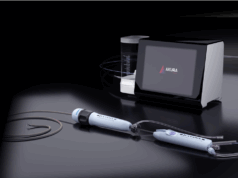
Bristol-Myers Squibb Company and Pfizer have announced that the Committee for Medicinal Products for Human Use (CHMP) of the European Medicines Agency (EMA) has adopted a positive opinion recommending that Eliquis (apixaban) be granted marketing authorisation for the treatment of deep vein thrombosis and pulmonary embolism, and the prevention of recurrent deep vein thrombosis and pulmonary embolism, in adults. The CHMP’s positive opinion will now be reviewed by the European Commission. The decision on whether to approve apixaban for this indication will be made by the European Commission and will be applicable to all European Union member states plus Iceland and Norway.
The positive opinion was based on the results from the pivotal AMPLIFY and AMPLIFY-EXT studies. The AMPLIFY (Apixaban for the initial management of pulmonary embolism and deep vein thrombosis as first-line therapy) study, was a randomised, double-blind, multicentre trial which evaluated apixaban therapy compared to standard of care. It included 5,395 patients (2,691 were randomised to apixaban and 2,704 were randomised to standard of care, which was initial enoxaparin treatment overlapped by warfarin therapy). Patients had confirmed symptomatic deep vein thrombosis or pulmonary embolism requiring treatment for six months. The primary efficacy endpoint was the composite endpoint of recurrent symptomatic venous thromboembolism (nonfatal deep vein thrombosis or nonfatal pulmonary embolism) or venous thromboembolism-related death. The primary safety endpoint was the incidence of major bleeding compared to standard of care.
The AMPLIFY-EXT (Apixaban after the initial management of pulmonary embolism and deep vein thrombosis with first-line therapy-extended treatment) study was a randomised, double-blind, multicentre trial. It included 2,486 patients (842 were randomised to apixaban 2.5mg, 815 were randomised to apixaban 5mg and 829 were randomised to placebo). Patients had prior venous thromboembolism and had completed six to 12 months of anticoagulation treatment for deep vein thrombosis or pulmonary embolism, and evaluated apixaban therapy compared to placebo. The primary efficacy endpoint was reduction of the composite of symptomatic, recurrent venous thromboembolism and death from any cause. The primary safety endpoint was the incidence of major bleeding.
Apixaban is also licensed for the prevention of venous thromboembolic events in adult patients who have undergone elective hip or knee replacement surgery.













